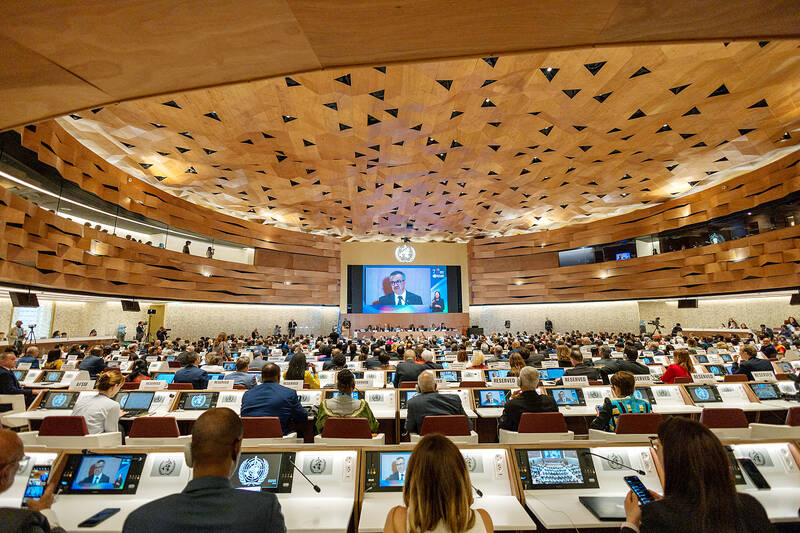The Ministry of Foreign Affairs yesterday thanked the countries who spoke up for Taiwan at the World Health Assembly (WHA), while condemning China for blocking Taiwanese reporters from the event.
Australia, Canada, the Czech Republic, France, Japan, the UK and the US voiced their support for Taiwan’s inclusion in the WHO in the three minutes each member state was allocated during the general discussion section of the WHA’s second and third plenary sessions on Monday.
In the fourth plenary session yesterday morning, Lithuania, Luxembourg, the Marshall Islands and Paraguay also voiced their support for Taiwan.

Photo: Reuters
Paraguay called for trust and multilateralism in preparing for future global health challenges and said the WHO should allow Taiwan to participate as an associate member.
“We should stop the politics, stop the neglect, for we are all vulnerable human beings,” the Marshall Islands said, using nearly half of its allotted time to advocate for Taiwan.
“In addressing global health issues such as infection control, it is important to refer to good examples of regions such as Taiwan,” Japan said, adding that the WHO should avoid creating geographical vacuum by leaving specific regions behind.
The UK said that “our ability to draw on expertise from everywhere remains paramount,” adding that including Taiwan would give the WHA “meaningful access to all relevant technical meetings.”
Guatemala said that bilateral cooperation with Taiwan has benefited the health of its people, and called Taiwan “a valuable ally.”
“Constructive stakeholders who have a role to play” should be included to combat common health problems worldwide, the US said, adding that it “continues to strongly support Taiwan’s meaningful participation” at the WHA and in the WHO’s work.
China asked to exercise its right to reply, countering those who supported Taiwan by citing UN Resolution 2758, WHA Resolution 25.1 and its “one China” principle.
UN Resolution 2758, adopted by the UN General Assembly in 1971, recognizes the People’s Republic of China as the only lawful representative of China to the UN, while WHA Resolution 25.1, adopted at the 25th WHA in 1972, expelled the Republic of China from the WHO.
China said that the gap in global disease prevention was merely hype and “pure nonsense.”
Using its right to reply, the US said that the COVID-19 pandemic made clear the urgency of engaging all public health experts and authorities when combating global health issues, so it would “continue its long-standing policy of supporting the meaningful participation of Taiwan.”
The Ministry of Foreign Affairs yesterday in a statement thanked the nations that spoke up for Taiwan.
It urged the WHO to uphold professionalism and neutrality by listening to the voices of justice among the international community and rejecting China’s political deception.
In a separate statement, the ministry expressed its dissatisfaction with the UN Office in Geneva, Switzerland, because it denied Taiwanese journalists access to the WHA due to pressure from China.
It also condemned China for its actions.
The UN should respect the fundamental right of Taiwanese journalists to enter the venue to cover UN meetings and activities instead of giving in to unreasonable political pressure, it said.

Chinese Nationalist Party (KMT) Chairman Eric Chu (朱立倫), spokeswoman Yang Chih-yu (楊智伃) and Legislator Hsieh Lung-chieh (謝龍介) would be summoned by police for questioning for leading an illegal assembly on Thursday evening last week, Minister of the Interior Liu Shyh-fang (劉世芳) said today. The three KMT officials led an assembly outside the Taipei City Prosecutors’ Office, a restricted area where public assembly is not allowed, protesting the questioning of several KMT staff and searches of KMT headquarters and offices in a recall petition forgery case. Chu, Yang and Hsieh are all suspected of contravening the Assembly and Parade Act (集會遊行法) by holding

PRAISE: Japanese visitor Takashi Kubota said the Taiwanese temple architecture images showcased in the AI Art Gallery were the most impressive displays he saw Taiwan does not have an official pavilion at the World Expo in Osaka, Japan, because of its diplomatic predicament, but the government-backed Tech World pavilion is drawing interest with its unique recreations of works by Taiwanese artists. The pavilion features an artificial intelligence (AI)-based art gallery showcasing works of famous Taiwanese artists from the Japanese colonial period using innovative technologies. Among its main simulated displays are Eastern gouache paintings by Chen Chin (陳進), Lin Yu-shan (林玉山) and Kuo Hsueh-hu (郭雪湖), who were the three young Taiwanese painters selected for the East Asian Painting exhibition in 1927. Gouache is a water-based

Taiwan would welcome the return of Honduras as a diplomatic ally if its next president decides to make such a move, Minister of Foreign Affairs Lin Chia-lung (林佳龍) said yesterday. “Of course, we would welcome Honduras if they want to restore diplomatic ties with Taiwan after their elections,” Lin said at a meeting of the legislature’s Foreign Affairs and National Defense Committee, when asked to comment on statements made by two of the three Honduran presidential candidates during the presidential campaign in the Central American country. Taiwan is paying close attention to the region as a whole in the wake of a

OFF-TARGET: More than 30,000 participants were expected to take part in the Games next month, but only 6,550 foreign and 19,400 Taiwanese athletes have registered Taipei city councilors yesterday blasted the organizers of next month’s World Masters Games over sudden timetable and venue changes, which they said have caused thousands of participants to back out of the international sporting event, among other organizational issues. They also cited visa delays and political interference by China as reasons many foreign athletes are requesting refunds for the event, to be held from May 17 to 30. Jointly organized by the Taipei and New Taipei City governments, the games have been rocked by numerous controversies since preparations began in 2020. Taipei City Councilor Lin Yen-feng (林延鳳) said yesterday that new measures by